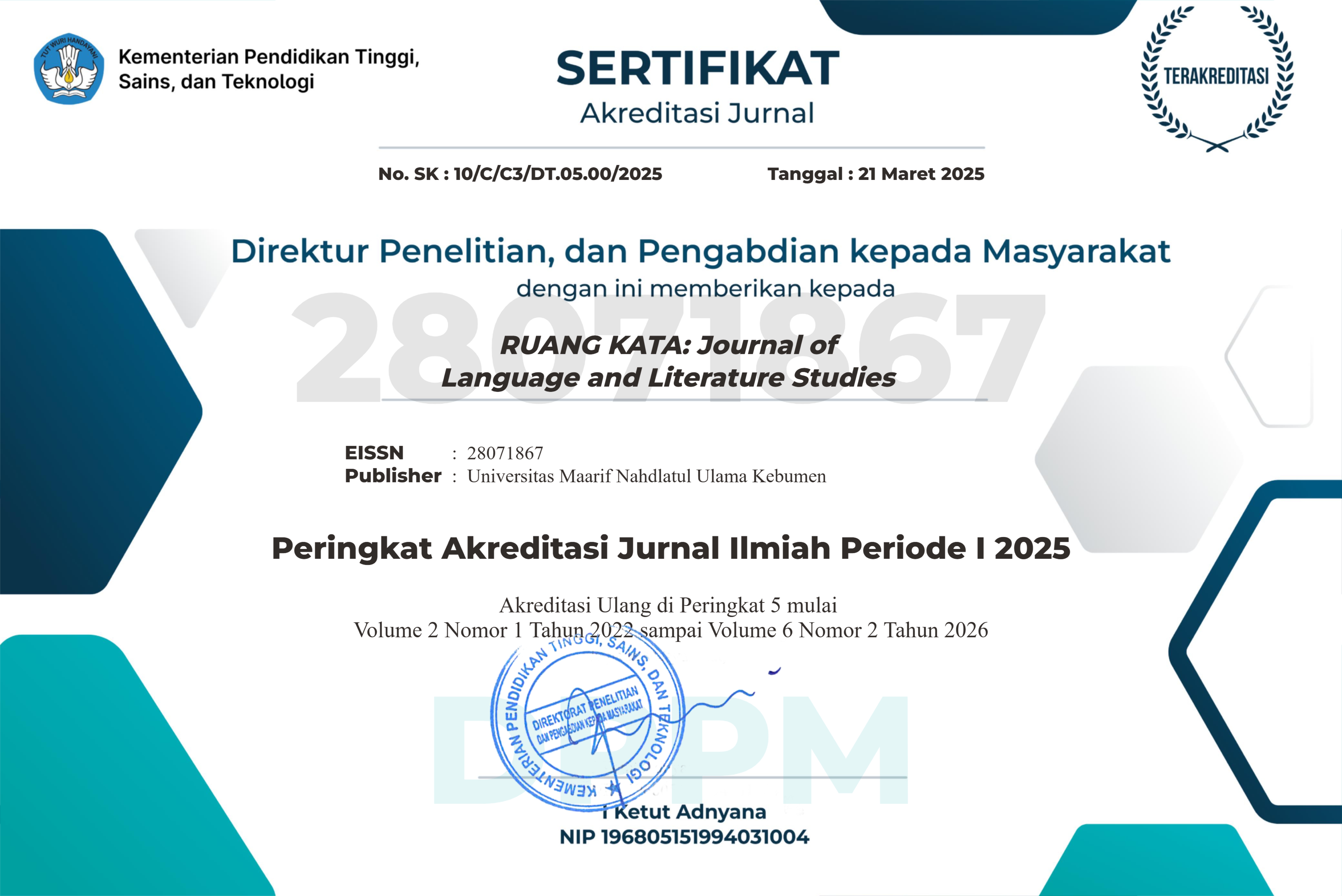Perubahan Fonem-Fonem Bahasa pada Penderita Labioschisis (Bibir Sumbing) pada Podcast Youtube Raditya Dika: Davi Siumbing Ngomongin Nopek
DOI:
https://doi.org/10.53863/jrk.v5i01.1629Keywords:
phoneme, phonology, cleft lip, podcast, youtubeAbstract
This study aims to describe the phonemic changes experienced by people with cleft lip by analyzing the phonemic pronunciation produced by them. The data in this study consists of utterances produced by people with cleft lip. The data source in this study is a person with cleft lip. This study was conducted using a qualitative descriptive method. Data collection techniques were carried out using observation and note-taking techniques. Data analysis was conducted by listening to a video recording from Radita Dika's YouTube podcast titled Davi Siumbing Ngomongin Nopek, then transcribing the patient's speech into written form. After the speech transcription data was obtained, the next step was to analyze the data based on phoneme changes and articulation errors, thereby answering the research questions posed in this study. The results of the study showed that there were types of phoneme changes that occurred, such as deletion, distortion, addition, and substitution. Patients with cleft lip had difficulty producing sounds that involved the meeting of the upper and lower lips, such as /p/, /b/, and /m/. Another difficulty is experienced in the pronunciation of phonemes that require air pressure from the roof of the mouth, such as /d/, /g/, /b/, /j/, /k/, /n/, /p/, and /t/. In addition, pronunciation variations experience changes or omissions of phonemes in some of the words produced. These changes can occur at the beginning, middle, or end of a word, leading to misunderstandings of meaning for listeners
References
Ashari, A., Safitri, I., & Camelia, I. Y. S. (2023). Gangguan Berbahasa Pada Penderita Labioschisis Atau Bibir Sumbing: Kajian Psikolinguistik. Jurnal Ilmiah Psikologi Insani, 8(2), 84-90..
Azizah, M., & Banowo, E. (2021). Motif Penggunaan Media Podcast Terhadap Pemenuhan Kebutuhan Informasi di Masa Pandemi Covid-19 pada Followers Instagram @Raditya_Dika. BroadComm, 3(1), 58–67. https://doi.org/10.53856/bcomm.v3i1.219
Budiani, M. S., Savira, S. I., Syafiq, M., Rahmasari, D., & Satiningsih. (2022). Pelatihan Teknik Terapi Wicara Sederhana untuk Diterapkan Selama Pandemi COVID-19 Bagi Orangtua Anak dengan Sumbing Bibir dan Langit-Langit. Journal.Unesa.Ac.Id, 1(1), 49–58. Retrieved from https://journal.unesa.ac.id/index.php/dedicate/article/view/19392
Chaer, A. (2009). Fonologi Bahasa Indonesia. Jakarta: PT Rineka Cipta.
Irawan, W. D., Fuad, M., Nur’aini, S. A., Edistina, E., Sapitri, V., & Santika, M. (2024). Perubahan Fonem pada Penderita Gangguan Berbahasa Bibir Sumbing. Edukasi Lingua Sastra, 22(1), 53–59. https://doi.org/10.47637/elsa.v22i1.1043
Muslich, M. (2022). Fonologi Bahasa Indonesia: Tinjauan Deskriptif Sistem Bunyi Bahasa Indonesia. Jakarta Timur: PT Bumi Aksara.
Seftiani. (2023). Analisis Gangguan Fonologi pada Mustofa dalam Podcast Wkwk Project By Genflik. Atmosfer: Jurnal Pendidikan, Bahasa, Sastra, Seni, Budaya, Dan Sosial Humaniora, 1(2), 309–321. https://doi.org/10.59024/atmosfer.v1i2.911
Syafrina, A. E. (2024). Penggunaan Podcast sebagai Media Informasi di Kalangan Mahasiswa Fakultas Ilmu Komunikasi Universitas Bhayangkara Jakarta Raya. Jurnal Komunikasi, Masyarakat Dan Keamanan, 4(2), 10–22. https://doi.org/10.31599/vk0z2815
Uzmi, M. F., & Aprilia, N. (2024). Hakikat Fonologi dalam Kajian Linguistik. 2(2). https://doi.org/10.59548/je.v2i2.282
Wahyuni, L. K. (2018). Sumbing Bibir dan Lelangit: Manajemen Fungsi Bicara. Jakarta Barat: CV. Read Octopus.
Wiharjo, K. E. T. (2022). Analisis Isi Pesan Moral pada Serial Podcast Youtube Deddy Corbuzier dalam Episode “Saya Bongkar Semua Siksa Gaga ke Laura.” Universitas Bhayangkara Surabaya, 29–35
Downloads
Published
How to Cite
Issue
Section
License
Copyright (c) 2025 Fina Dyah Madalena, Eko Suroso

This work is licensed under a Creative Commons Attribution-ShareAlike 4.0 International License.
Authors retain copyright and grant the journal right of first publication with the work simultaneously licensed under a Creative Commons Attribution-ShareAlike 4.0 International License that allows others to share the work with an acknowledgment of the work’s authorship and initial publication in this journal














